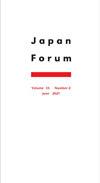There are no tricks in translation: wordplay and similarity in the writings of Tawada Yōko
IF 0.2
Q2 AREA STUDIES
引用次数: 0
Abstract
Abstract Tawada Yōko publishes in both Japanese and German: while much scholarship on Tawada has examined difference in her work by focusing on topics such as migration, foreignness, and exophonic authorship (writing in a language other than one’s first language), the present essay considers her writing as an exploration of similarities. I examine similarities at three scales: word-to-word, text-to-text, and oeuvre-to-oeuvre. One of the salient formal traits of Tawada’s work is its incorporation of wordplay based on coincidental resemblances between words in unrelated languages (e.g., German and Japanese). Tawada’s work on wordplay adapts Sigmund Freud’s ideas about the interpretation – or translation, in his occasional metaphor – of dreams and thus embraces a capacious understanding of translation. But – here is the intertextual comparison – when Tawada translates her own work, as when she rewrites her novel Yuki no renshūsei in German as Etüden im Schnee, sometimes a wordplay that is central to one version is omitted in the other, with important consequences for interpretation. Finally, Tawada’s polyglot oeuvre, taken in the aggregate, is characterized as a strategic continuation of a tradition of polyglot authorship – a claim that is, I argue, further underscored by themes in Tawada’s recent fictions.翻译中没有技巧:Tawada作品中的文字游戏和相似性Yōko
Tawada Yōko以日语和德语两种语言出版:虽然许多关于Tawada的学术研究都通过关注移民、异域性和外音作者(用母语以外的语言写作)等主题来研究她作品中的差异,但本论文认为她的作品是对相似性的探索。我从三个方面考察了相似性:字对字、文本对文本和作品对作品。Tawada作品的一个突出的形式特征是它结合了基于不相关语言(如德语和日语)中单词的巧合相似的文字游戏。Tawada关于文字游戏的研究改编了西格蒙德·弗洛伊德关于梦的解释(或翻译,在他偶尔的比喻中)的观点,从而包含了对翻译的广泛理解。但是——这是互文比较——当多和田翻译她自己的作品时,就像她把她的小说《Yuki no renshūsei》用德语改写成《et den im Schnee》一样,有时在一个版本中很重要的文字游戏在另一个版本中被省略了,这对解释产生了重要的影响。最后,从总体上看,多和田的多语言作品的特点是对多语言作家传统的战略性延续——我认为,这一主张在多和田最近的小说主题中得到了进一步的强调。
本文章由计算机程序翻译,如有差异,请以英文原文为准。
求助全文
约1分钟内获得全文
求助全文

 求助内容:
求助内容: 应助结果提醒方式:
应助结果提醒方式:


